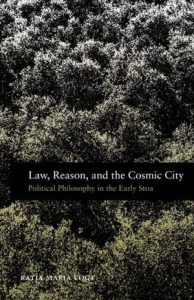Law, Reason, and the Cosmic City: Political Philosophy in the Early Stoa (OUP, 2008), paperback (2012), Amazon, Chinese edition, East China Normal University Press (2022)

In Law, Reason, and the Cosmic City: Political Philosophy in the Early Stoa, I reconstruct core components of Stoic ethics, physics, and political philosophy. For the Stoics, virtue consists in perfect reasoning. The wise person is a cognizer and agent who has perfected her reason. She has knowledge and acts based on this knowledge. Like the wise person, the cosmos is a living being that has reason. Stones, plants, animals, and people are different kinds of parts of the cosmos, which is an integrated, law-governed whole. Human beings are thus portions of the world, parts of a whole.
This proposal has political implications: other human beings are fellow-parts of the universe. When one acts based on knowledge of nature, one relates to others are fellow-components of the same whole. The wise person understands her status as part of nature, and she understands that the only fundamental law is the law of nature. What, then, does it mean to call the cosmos a city? First, a city is a place governed by the law. Yet only the law pervading the cosmos can be considered a true law, and thus the cosmos is the only real city. Second, a city is a dwelling-place; in the case of the cosmos, the dwelling-place of all human beings. Finally, a city demarcates who belongs together as fellow-citizens.
The thought that we should view all other human beings as belonging to us – as parts of the same kind that we are, and of the same whole – constitutes the core of Stoic cosmopolitanism. All human beings are citizens of the cosmic city in the sense of living in the world. But it is one thing to belong to the world in this sense, and another thing to comprehend this: to fully understand one’s status as a component of nature. The demanding task of acquiring wisdom allows a person to become a citizen in the strict sense: someone who lives according to the law, as the gods do. In this sense, the sage is the only citizen, relative, friend and free person. For the Stoics, she is the only person who fully lives up to being a citizen of the cosmos.
The Stoics emphasize the revisionary nature of their theory. Whatever course of action perfect deliberation commands, even if it be cutting off one’s limb and eating it, we should act on its command, and not be held back by conventional judgments. Perfect action, then, involves substantive knowledge of what is valuable, what is good, and what is to be done. I argue against two widespread interpretations of the common law: that it consists of rules, and that lawful action is what right reason prescribes. I reject the rules-interpretation as fundamentally misguided. It mistakes Stoic talk about precepts for quasi-Kantian (or otherwise modern) ideas about rules. The prescriptive reason-interpretation is superior. It recognizes that what matters, for the Stoics, is that one is a good reasoner. But it misses the substantive side of the Stoic conception of the law. The sage fully understands what is valuable for human beings, and this makes her actions lawful.
“[The book] provides an innovative and convincing way in which to understand a great many difficult Stoic ideas in the areas of politics and ethics. It also makes a very good case for integrating the political ideas into the context of Stoic ethics more generally. And best of all, it makes Stoic political theory seem reasonable, at least in the context of Stoicism as a whole – rather than simply crazy, as it has often looked before – and also makes it understandable why they should want to present this theory as political.” Richard Bett, The Johns Hopkins University
“Interesting and illuminating.” Gisela Striker, Harvard University
“The author argues that the very scanty evidence about Zeno’s Republic, if correctly understood, does not propose a framework for an actual city; rather it sets out what it would mean for someone to have wisdom (i.e. be virtuous, on the Stoic view): it would be to understand oneself as a citizen in the community of gods and men structured by the law constituted by perfect rationality. Her book thus aims to serve as a counterweight or alternative to Schofield’s The Stoic Idea of the City.” Charles Brittain, Cornell University
“Vogt seeks to relocate Stoic political philosophy from the marginal position she thinks it occupies in modern scholarship. Its key conceptions make more sense and gain in interest, she proposes, when we see them as ‘integral to our understanding of such central concepts of Stoic philosophy as nature, cosmos, wisdom, and reason’ (7). That must be right: Vogt has articulated a first-rate project.” Malcolm Schofield, University of Cambridge
